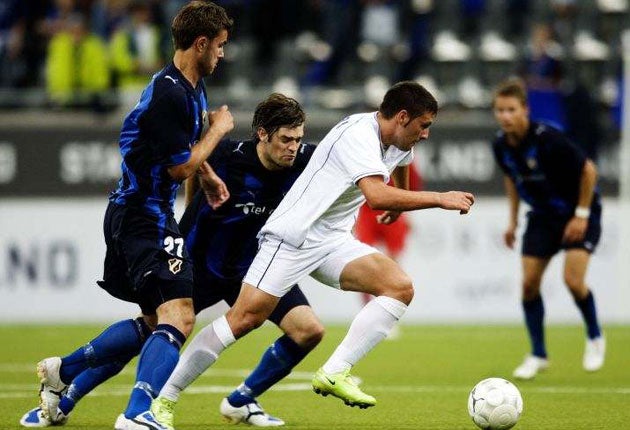Uefa name five teams involved in inquiry into match-fixing
Two Albanian clubs and teams from Slovenia, Latvia and Hungary in spotlight

Your support helps us to tell the story
From reproductive rights to climate change to Big Tech, The Independent is on the ground when the story is developing. Whether it's investigating the financials of Elon Musk's pro-Trump PAC or producing our latest documentary, 'The A Word', which shines a light on the American women fighting for reproductive rights, we know how important it is to parse out the facts from the messaging.
At such a critical moment in US history, we need reporters on the ground. Your donation allows us to keep sending journalists to speak to both sides of the story.
The Independent is trusted by Americans across the entire political spectrum. And unlike many other quality news outlets, we choose not to lock Americans out of our reporting and analysis with paywalls. We believe quality journalism should be available to everyone, paid for by those who can afford it.
Your support makes all the difference.Uefa has vowed to take stiff action against anyone found guilty of match-fixing after naming five clubs involved in suspect fixtures yesterday. Europe's governing body met with nine national football associations to discuss the massive investigation into both domestic and continental matches being undertaken by authorities in Germany.
The case involved around 200 matches, and Uefa has launched its own inquiry into seven Champions League and Europa League matches under its own jurisdiction. Those matches involved five clubs: KF Tirana and KS Vllaznia Shkoder of Albania, FC Dinaburg of Latvia, NK IB Ljubljana of Slovenia, and Budapest Honved of Hungary.
Uefa promised to fully prosecute the case if wrongdoing is found. "Uefa and the national associations will not refrain from taking severe action within their responsibility and Uefa will provide assistance and co-ordinate matters in all procedures whenever necessary," a Uefa statement said.
"Uefa and the nine associations are fully committed to eradicate these malpractices that are threatening the game. No distinction will be made as to whether this malpractice originates from a player, an official or any other individual."
That is almost certain to include criminal prosecutions, as Uefa said it was working closely with the German authorities. "Uefa wishes to stress that it has been co-operating fully with the German police and authorities on the case and indeed, following a request from the German police for information on a number of matches, Uefa was able to assist thanks to its Betting Fraud Detection System that has been monitoring all Uefa competitions and European national league first- and second-division matches for irregular betting patterns since July 2009.
"Uefa will file criminal complaints, together with the relevant national associations, as soon as possible against clubs, officials and/or players in those countries concerned."
One Champions League qualifier and six Europa League qualifiers, all played between 16 July and 6 August, are under investigation.
The games being looked at by Uefa are the Champions League second-round qualifier between Stabaek IF and Tirana; both legs of the the Europa League second-round qualifiers between Bnei Yehuda Tel-Aviv FC and FC Dinaburg, and KS Vllaznia and Rapid Vienna; and both legs of the Europa League third-round qualifier between NK IB Ljubljana and Metallurg Donetsk.
In a lengthy statement, Uefa added that it was also looking into the roles of three referees and one other official in the case.
Uefa yesterday met with the national associations of Austria, Belgium, Bosnia-Herzegovina, Croatia, Hungary, Slovenia, Switzerland and Turkey to discuss all the matches under investigation.
"Uefa and the national associations are facing a case of organised crime which exceeds the investigative power of sports jurisdiction," Uefa's statement added. "They are grateful to the state authorities for their firm action, also in the interest of sport. Uefa and the national associations will contact the competent authorities in each country to obtain access to the relevant information involving clubs and individuals within their jurisdiction."
The case came to light last Friday.
German authorities confirmed that 32 matches in Germany were under suspicion, including four in Bundesliga 2, with the remainder in lower leagues.
Several arrests have already been made across Europe after the investigation began at the start of the year.
The general secretary of the German Football Association (DFB), Wolfgang Niersbach, called for the whole truth behind the allegations to be laid bare. "Everyone is interested in a quick and complete solution," he said in a statement released by the DFB. "Despite that we should not allow ourselves to get frantic, but rather we have to give the authorities the necessary time.
"And however bitter the truth may be, it must be completely on the table and the sanctions will be tough."
Join our commenting forum
Join thought-provoking conversations, follow other Independent readers and see their replies
Comments